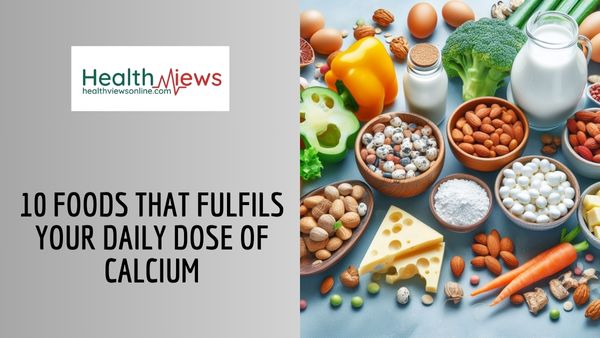Calcium is not only the most abundant mineral in the body, but it is also essential for proper bodily function. Dairy, as well as a variety of other meals, can help prevent calcium deficiency and maintain healthy calcium levels. Calcium is found in your bones and teeth and is important for heart health, muscular function, and nerve signaling.
Most adults should consume at least 1,300 mg of calcium per day, while certain populations, such as teenagers, postmenopausal women, and older persons, require more. Although dairy products such as milk, cheese, and yogurt are particularly high in calcium, there are several dairy-free calcium sources available.
Also, Read All about Climatarian Diet: A Detailed Guide on Climatarian Diet for Beginners!
Here are ten calcium-rich foods (many of which are non-dairy) to fulfill your daily dose of Calcium
1. Seeds
Poppy, sesame, celery, and chia seeds are all little nutritious powerhouses that are strong in calcium. For example, 1 tablespoon (9 grams) of poppy seeds contains 127 mg of calcium or 10% of the daily value (DV). Source
In 1 tablespoon (9 grams), sesame seeds provide 7% of the daily value for calcium, as well as copper, iron, and manganese.
2. Cheese
The majority of cheeses are high in calcium. Parmesan cheese has the greatest, with 242 mg per ounce (28 grams), or 19% of the DV. Softer cheeses contain less. For example, 1 ounce (28 grams) of Brie contains only 52 mg or 4% of the DV. Source
3. Yogurt
Yogurt is a good source of calcium. Many types of yogurt also contain probiotics, which are helpful bacteria that can benefit immune function, heart health, and nutrient absorption. One cup (245 g) of plain yogurt includes 23% of the daily need for calcium, as well as phosphorus, potassium, and vitamins B2 and B12. Source
Low-fat yogurt may have even more calcium, with 34% of the daily value (DV) in 1 cup (245 grams). Source
Also, Watch health views web stories: Most Common Calcium Deficiency Symptoms
4. Beans and lentils
Fibre, protein, and minerals such as iron, zinc, folate, magnesium, and potassium are plentiful in beans and lentils. Some cultivars contain adequate calcium levels, such as winged beans, which provide 244 mg, or 19% of the DV, in a single cooked cup (172 grams). Source
White beans are also a good source, with 1 cup (179 grams) providing 12% of the daily requirement. Other bean and lentil varieties have less, ranging from roughly 3-4% of the DV per cup (175 grams).
5. Almonds
The most calcium is found in almonds than any other nut. 1 ounce (28 grams) of almonds, or around 23 nuts, provides 6% of the DV. Eating nuts may also help lower blood pressure, body fat, and a variety of other metabolic disease risk factors. Source
Almonds also include 3.5 grams of fiber (28 grams) per ounce, as well as healthful fats and protein. They also contain significant amounts of magnesium, manganese, and vitamin E.
6. Whey protein
Whey is a protein found in milk that has been extensively researched for its potential health advantages. It’s also a good source of protein and high in swiftly digested amino acids, which aid in muscle building and recuperation.
Whey is also high in calcium – a 1.2-ounce (33-gram) scoop of whey protein powder isolate provides about 160 mg or 12% of the daily value. Source
7. Fortified cereals
Fortified foods, such as cereals, can help you achieve your daily calcium requirements. Certain cereals can contain up to 1,000 mg (100% of the DV) per serving – and that’s before you add milk. Source
However, bear in mind that your body cannot absorb all of that calcium at once, so spread it out over the day.
8. Amaranth
Amaranth is a high-nutritional-value pseudocereal. It’s high in minerals including manganese, magnesium, phosphorus, and iron, and it’s high in folate. One cup (246 g) of cooked amaranth grain contains 116 mg of calcium or 9% of the daily value. Source
Amaranth leaves provide much more calcium, with 21% of the DV per cooked cup (132 grams), as well as vitamins A and C.
Also, Read All about Iron: Functions, Daily Dose, Deficiency, Sources & Toxicity
9. Fortified drinks
If you don’t consume milk, many fortified non-dairy beverages include calcium. One cup (237 mL) of fortified soy milk has 23% of the daily value. Furthermore, with 6 grams of protein, it is the most nutritionally equivalent nondairy milk to cow’s milk. Source
Fortification is not limited to non-dairy milk. Orange juice, for example, can be fortified to provide up to 27% of the DV per cup (237 mL).
10. Milk
Milk is one of the best and most widely available calcium sources. 306-325 mg are present in one cup (237 mL) of cow’s milk, depending on whether it is whole or nonfat. Dairy calcium is also very well absorbed. Source
Milk is also a good source of protein, vitamin A, and vitamin D. Goat’s milk is another high-calcium source, with 327 mg per cup (237 mL).
Calcium is an essential mineral that is involved in numerous aspects of health. While dairy products contain most of this mineral, there are many other good sources, many of which are plant-based. You may easily meet your calcium requirements by consuming the variety of foods listed in this article.
Also, watch health views web stories: 8 Foods That Fulfills Your Iron Dose





